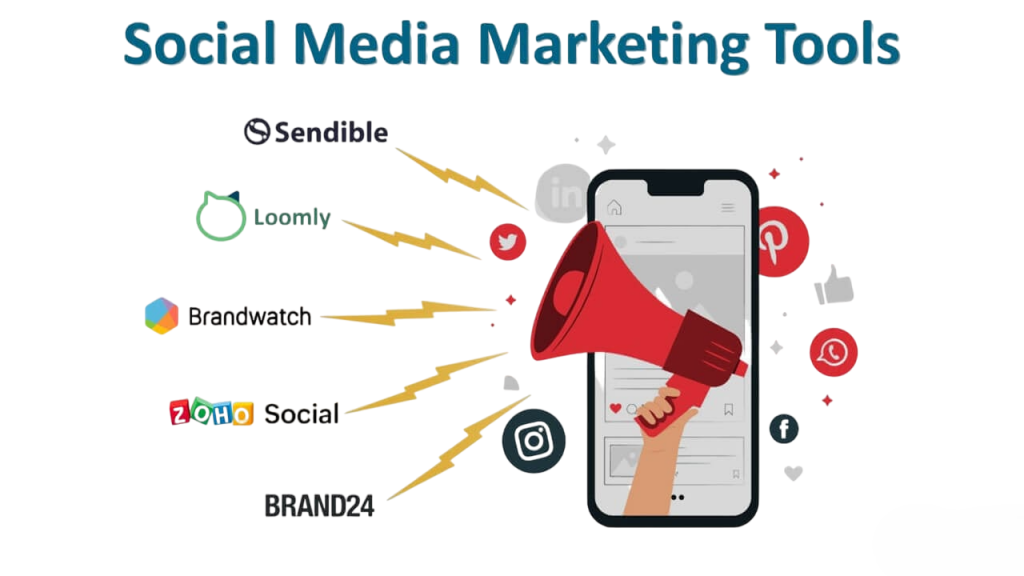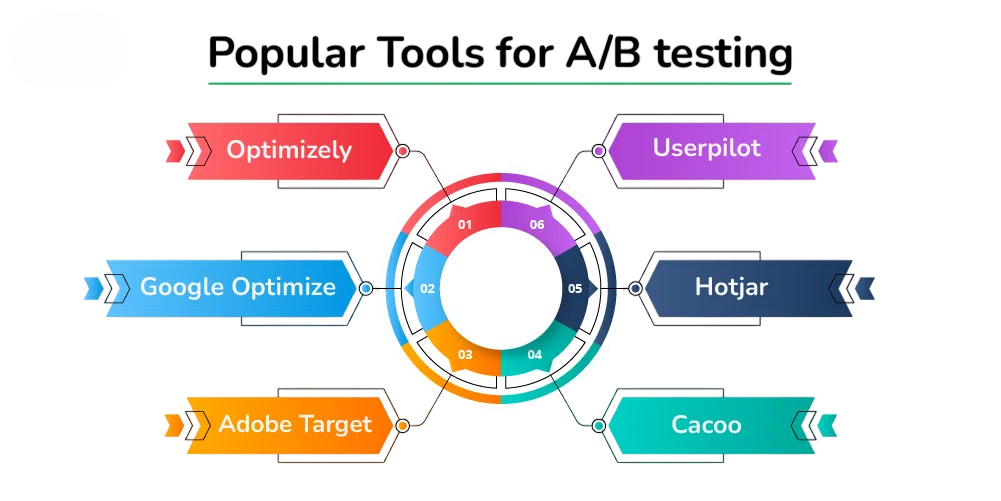
- Introduction to Digital Marketing Tools
- SEO Tools
- SEM Tools
- Social Media Marketing Tools
- Email Marketing Tools
- Content Marketing Tools
- Analytics and Reporting Tools
- CRM & Automation Tools
- Design & Video Tools
- A/B Testing Tools
- Competitor Analysis Tools
- Choosing the Right Tools
- Conclusion
Introduction to Digital Marketing Tools
In today’s digital-first world, marketers rely heavily on a wide range of tools to plan, execute, track, and optimize their campaigns. Digital marketing tools help streamline tasks, provide deep insights into customer behavior, improve team productivity, and drive better ROI core advantages emphasized in Digital Marketing Training, where learners master platforms like Google Analytics, SEMrush, and HubSpot to automate workflows, personalize campaigns, and measure performance across channels. These tools empower marketers to make smarter decisions and scale impact efficiently. Whether it’s managing SEO, automating emails, analyzing web traffic, or creating visual content, these tools play a crucial role in every stage of a marketing funnel. For marketers from freelancers to global enterprises understanding and effectively using these tools can make the difference between campaign success and failure.
Ready to Get Certified in Digital Marketing? Explore the Program Now Digital Marketing Online Training Offered By ACTE Right Now!
SEO Tools
Search Engine Optimization (SEO) tools are crucial for enhancing a website’s visibility on search engines, such as Google. These tools assist with keyword research, backlink monitoring, on-page optimization, and competitor analysis. Tools like SEMrush, Ahrefs, and Ubersuggest offer in-depth keyword data, content gap analysis, and link-building opportunities core functionalities that define the Scope of Digital Marketing, where professionals leverage these platforms to uncover ranking opportunities, audit competitor strategies, and strengthen domain authority. Mastery of these tools enables marketers to execute precision-driven SEO campaigns and scale visibility across search ecosystems. Google Search Console is another invaluable tool that provides direct insights from Google about a site’s indexing status and performance. Tools like Yoast SEO and Rank Math (mainly for WordPress users) help ensure that content is optimized for search engines, checking key elements such as meta tags, headers, and readability.
SEM Tools
- Search Engine Marketing (SEM), which typically involves paid advertising, requires precision in budget allocation, keyword targeting, and ad copy creation. Tools like Google Ads, Microsoft Advertising, and SpyFu help marketers create, monitor, and refine paid search campaigns.
- Google’s Keyword Planner is indispensable for identifying potential search terms and estimating CPC. Tools such as WordStream simplify ad creation and optimization, while Optmyzr provides advanced features for automating and scaling SEM campaigns. These tools also offer A/B testing capabilities to help determine which ads drive the highest conversions.
- Social media marketing tools enable businesses to establish a robust online presence across various platforms, including Facebook, Instagram, LinkedIn, X (formerly Twitter), and TikTok. Tools such as Hootsuite, Buffer, and Sprout Social enable users to schedule posts, monitor engagement, and analyze performance from a single dashboard.
- Canva and Crello help you create eye-catching social content without needing a professional designer. For influencer management and campaign tracking, platforms like BuzzSumo and Upfluence are powerful. Social media tools not only save time but also help ensure consistent brand messaging and foster community engagement.
- Data-driven decision-making is at the core of successful marketing, and analytics tools help marketers measure what matters. Google Analytics is one of the most widely used tools to monitor website traffic, user behavior, and conversion paths. Google Data Studio and Looker Studio enable stakeholders to build customized reports.
- Platforms like Hotjar and Crazy Egg provide heatmaps and user session recordings to understand website usability. For social and paid ad metrics, Sprout Social, Kissmetrics, and Mixpanel offer more granular reporting. These tools make it easier to attribute ROI, identify bottlenecks, and refine marketing tactics.
- Customer Relationship Management (CRM) tools play a central role in managing interactions with leads and customers. They store contact details, track interactions, and facilitate personalized communication. HubSpot, Salesforce, and Zoho CRM are industry-leading platforms that integrate seamlessly with marketing tools.
- Marketing automation tools, such as Marketo, ActiveCampaign, and Pardot, help nurture leads through automated email sequences, lead scoring, and behavior-based segmentation. Automation saves time, ensures prompt follow-up, and enhances the customer experience by delivering relevant content at the right time.
- With thousands of digital marketing tools available, it’s essential to choose those that align with your business goals, team size, and budget. Start by identifying your biggest marketing challenges, whether it’s lead generation, SEO, or email nurturing. Then prioritize tools that solve those specific pain points. Always take advantage of free trials to test features, usability, and support.
- Consider integrating your current tech stack with your new solution (e.g., CRM, CMS, payment gateway). User reviews, community forums, and third-party comparisons can also help in making informed decisions. It’s also crucial not to over-rely on too many tools, as this can lead to tool fatigue, data silos, and inefficiency. Instead, build a focused stack of complementary tools that cover all aspects of your marketing workflow from ideation to execution and measurement.
To Explore Digital Marketing in Depth, Check Out Our Comprehensive Digital Marketing Online Training To Gain Insights From Our Experts!
Social Media Marketing Tools

Email Marketing Tools
Email remains one of the highest ROI-generating marketing channels, and its success heavily relies on the tools used to manage campaigns. Mailchimp, ConvertKit, ActiveCampaign, and MailerLite are popular choices that enable users to create email lists, segment their audiences, send personalized campaigns, and automate email workflows core functionalities explored in Digital Marketing Training, where learners evaluate platform capabilities, compare automation depth, and master segmentation logic to build scalable email strategies tailored to audience behavior and campaign goals. Features such as A/B testing, open rate tracking, and advanced automation workflows help marketers refine their communication strategies. HubSpot and Sendinblue also offer CRM integration, allowing email marketing to become a more comprehensive customer engagement solution.
Looking to Digital Marketing Training? Discover the Digital Marketing Expert Masters Program Training Course Available at ACTE Now!
Content Marketing Tools
Content is the backbone of digital marketing, and content marketing tools help in planning, creating, and distributing content effectively. Trello, Asana, and Notion are excellent for content planning and collaboration. Grammarly ensures that written content is error-free and polished, while Hemingway Editor improves readability two essential tools highlighted in What are the Rules of Blogging, where writers learn to balance grammatical precision with stylistic clarity. Grammarly excels at catching contextual errors and refining tone, while Hemingway simplifies sentence structure and boosts readability scores, helping bloggers craft content that’s both professional and engaging. For ideation and trend discovery, tools like BuzzSumo and AnswerThePublic offer insights into the topics that are being searched for. Content distribution platforms such as Medium, Outbrain, and Taboola help amplify reach. Tools like CoSchedule Headline Analyzer can also boost engagement by optimizing headlines.
Analytics and Reporting Tools
Preparing for Digital Marketing Job Interviews? Have a Look at Our Blog on Digital Marketing Interview Questions and Answers To Ace Your Interview!
CRM & Automation Tools
Design & Video Tools
Visual content is more engaging and memorable than text, making design and video tools critical for digital marketers. Canva is a user-friendly platform for creating graphics, presentations, and social media posts an essential design tool featured in Digital Marketing Ebooks, where marketers and content creators learn to build visually compelling assets that boost engagement, reinforce brand identity, and streamline campaign execution. With drag-and-drop simplicity and a rich template library, Canva empowers professionals to produce polished visuals without needing advanced design skills. Adobe Creative Cloud (including Photoshop, Illustrator, and Premiere Pro) offers professional-level design and video editing capabilities. Tools like Lumen5, Animoto, and InVideo make it easier to turn blog posts into videos, which are ideal for YouTube and social media platforms. For quick animations or GIFs, tools like GIPHY and Easily are useful. With video marketing on the rise, these tools empower marketers to produce high-quality content without large budgets.
A/B Testing Tools
A/B testing enables marketers to experiment with various versions of ads, emails, landing pages, and CTAs to determine which ones resonate most effectively with their target audience. Tools like Google Optimize, Optimizely, and VWO (Visual Website Optimizer) enable marketers to split-test different variants and track key performance metrics, including clicks, conversions, and bounce rates tactics that support How To get more subscribers to YouTube, where creators learn to refine thumbnails, titles, and CTAs through A/B testing. These tools help identify what drives engagement, improves watch time, and ultimately boosts subscriber growth by aligning content with viewer behavior. These tools are vital for conversion rate optimization (CRO), helping eliminate guesswork and base decisions on actual data. Proper A/B testing can significantly improve campaign outcomes, especially in paid marketing and lead generation.

Competitor Analysis Tools
Choosing the Right Tools
With thousands of digital marketing tools available, it’s essential to choose those that align with your business goals, team size, and budget. Start by identifying your biggest marketing challenges, whether it’s lead generation, SEO, or email nurturing. Then prioritize tools that solve those specific pain points an actionable strategy emphasized in Impact of Social Media, where businesses leverage platforms like Brandwatch, Hootsuite Insights, and sentiment analysis engines to uncover customer frustrations, monitor feedback trends, and respond with precision. These tools transform raw social data into insights that drive product improvements, service enhancements, and brand loyalty. Always take advantage of free trials to test features, usability, and support. Consider integrating your current tech stack with your new solution (e.g., CRM, CMS, payment gateway). User reviews, community forums, and third-party comparisons can also help in making informed decisions. It’s also crucial not to over-rely on too many tools, as this can lead to tool fatigue, data silos, and inefficiency. Instead, build a focused stack of complementary tools that cover all aspects of your marketing workflow from ideation to execution and measurement.
Conclusion
Digital marketing tools are indispensable assets in modern marketing operations. They amplify productivity, enhance data visibility, and enable more targeted, efficient campaigns. From SEO to social media, email to analytics, each tool plays a specific role in driving growth and achieving marketing goals. As the digital landscape evolves, staying updated with the latest tools and continuously optimizing your stack will keep you ahead of the competition an adaptive mindset cultivated in Digital Marketing Training, where learners explore emerging platforms, refine their MarTech stack, and master integration strategies to boost efficiency, enhance targeting, and maintain a competitive edge in fast-moving markets. Whether you’re a beginner or a seasoned professional, mastering the correct set of tools is key to succeeding in today’s competitive online environment.




